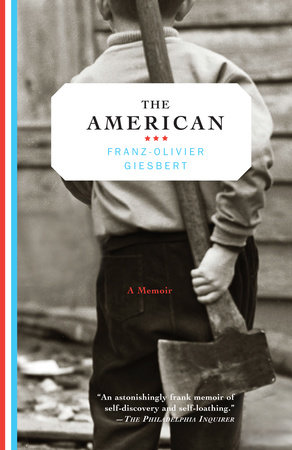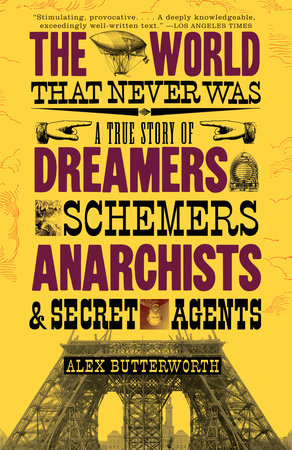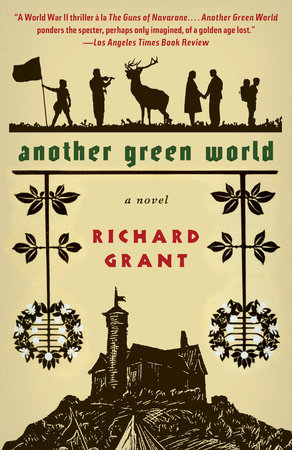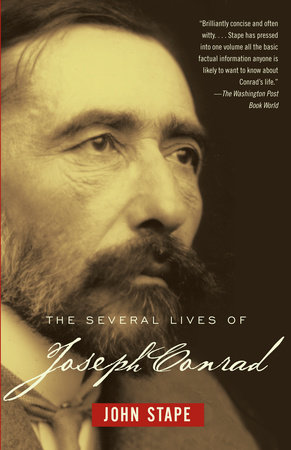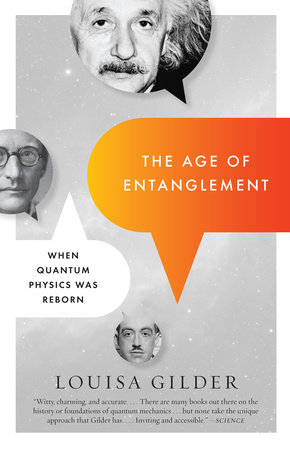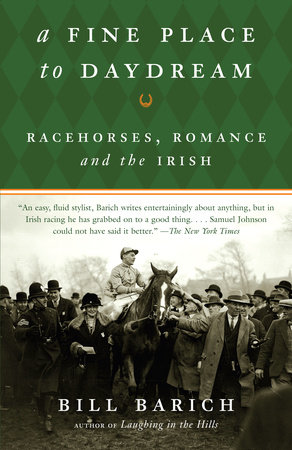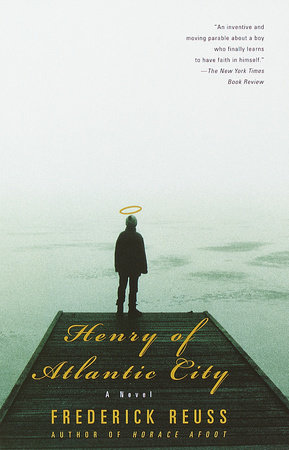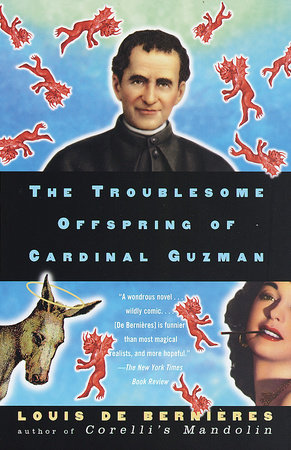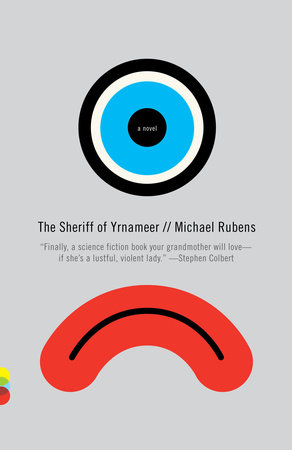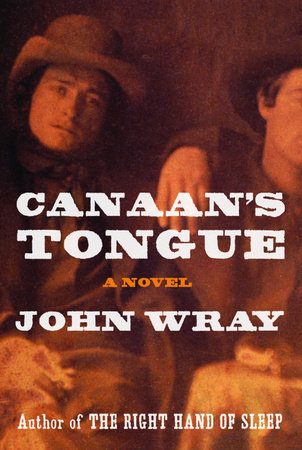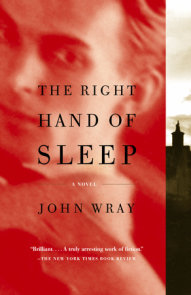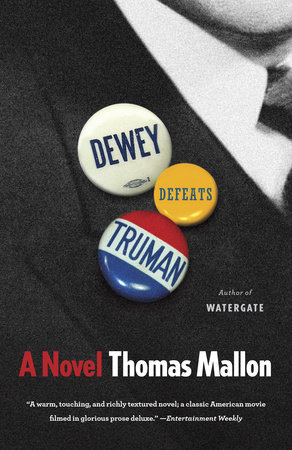Author Q&A
A Conversation with
JOHN WRAY
Q: What made you decide to write a novel about the stolen slave trade in the South on the eve of the Civil War, especially since you grew up in the northeast and your first novel was about Austria?
A: My mother is Austrian and my father is American, so I’ve had the privilege (sometimes a dubious one) of discovering that relatives of mine played roles, both commendable and shameful, in some of the most momentous events in both countries. One of the amazing things about looking into your family’s past is the discovery that your grandparents or great-grandparents were intimately involved in the most dramatic events of world history—that, for them, legendary events like D-Day or the Battle of Gettysburg were actual lived experiences.
My first novel, The Right Hand of Sleep, is a reckoning of sorts with the legacy of my mother’s Austrian family, from the specter of the Third Reich to the great disappointment of Socialism. Canaan’s Tongue, on the other hand, is a coming to terms with my father’s family and with my American heritage–relatives of ours were both slaveholders and abolitionists, as well as soldiers on both sides in the Civil War. The Union general in charge of the Western Theater, William Starke Rosecrans, is a direct ancestor on my father’s side. So I’ve wanted to write a book about slavery and the Civil War for quite some time.
Q: You base your most dastardly character “The Redeemer” on the real life criminal, John Murel—as notorious in his day as Jesse James (yet not nearly as well known as James today). What was so despicable about him and how does your character differ from him?
A: America has had its share of larger-than-life criminals, but John Murel is certainly a contender for the most spectacular and heinous. He made a name for himself in the mid 1850’s as a horse-thief, but he found the profit-margin to be too small. His solution was simple: switch to a more valuable commodity. He hit on the idea of hiring mulatto agents to pose as Underground Railroad operatives, and enticing slaves in the deep South, where the mortality rate was highest, to run away. Once they had done so, the runaways were told that it was necessary to sell them one more time, to raise funds for their passage north. It was agreed that they’d run away from their new masters after two or three months, and meet Murel’s agents at some tucked-away place on the river, to continue their run. Instead of being brought to freedom, however, the slaves–or contrabands, as they were called–would either be returned to their original masters, and a bounty collected on them, or else they’d be murdered outright, and their bodies would vanish without a trace into the Mississsippi.
Being a novelist, I’ve altered Murel’s story to suit the needs of my narrative. The details of his business are taken straight from 19th-century accounts, but the character of ‘Thaddeus Morelle’ in Canaan’s Tongue is altogether my own invention (which creeps me out a little, I have to admit!).
Q: Is it true that this “organized crime” of slave trading became so large at the time that there were actual well-to-do shareholders in the community? And can you explain a little how that system worked?
A: Incredible as it seems, Murel’s system worked like clockwork. It would be tempting to view his gang as a somewhat grotesque by-product of antebellum society, an unpleasant footnote to a romantic, bygone era, if his scheme hadn’t been so astonishingly successful. Within a few years of its inception, the operation had grown so profitable, and so pervasive, that when it was finally exposed and the list of its shareholders published, it contained so many respected names (from both the South and the North) that the report was dismissed out of hand.
Q: Was your initial interest in this subject the setting/time period, or was it in order to tell a certain kind of story?
A: One of the things that attracted me right away was the role of Murel’s Gang as one of the early American mega-corporations: in its heyday it had over a thousand employees and shareholders in virtually every state. Parallels were just waiting–I’d almost say, demanding–to be drawn to contemporary America. Today’s corporations have never possessed more direct and open political influence, or fewer scruples about exploiting that influence to the fullest possible degree. Murel would have thrived in the U.S. of today.
Q: The book is narrated from a few different characters’ points of view, though mostly through the appropriately named Virgil. The language they use is sometimes colorful and profane, sometimes 19th-century formal. How were you able to capture those voices/that vernacular?
A: I read so many Victorian novels as a kid—borrowed from my mother, who was addicted to them—that a certain type of 19th-century rhetoric comes (almost) naturally to me. And of course Mark Twain helped; Life on the Mississippi and Huckleberry Finn were my guiding lights for Canaan’s Tongue. I would say they were my bible, but the Bible itself was crucial as well. Murel used the Bible cunningly. He used religion—or the rhetoric of religion—to manipulate the slaves he traded in, the politicians he corrupted, and even his partners-in-crime. He also, in his early years, liked to impersonate a preacher along the Natchez Trace in Mississippi, delivering soul-searing sermons while his colleagues relieved the faithful of their horses and their pocketbooks.
Q: Necessarily in your depiction of how this band of criminals treats the slaves and each other, there are moments of great violence and brutality. Was that hard to write?
A: I’ve never found violent scenes hard to write; they have an innate excitement to them. It’s the aftermath of writing violence that’s hard. A certain amount of self-distrust sets in after you’ve written something genuinely disturbing. You find yourself questioning your own motives for writing the scene, and attempting to justify the material as essential to the story. Believe it or not, an earlier version of Canaan’s Tongue was much more graphic. Later, I found it more effective, in many places, to suggest the brutality of Murel’s gang, as well as the society it sprang from, rather than to show it in every last blood-curdling detail.
Q: How did you go about doing your research for this book? Aside from Mark Twain’s mention in Life on the Mississippi, was there much source material on Murel or the actual events of the day?
A: There was surprisingly little source material, considering that Murel was as infamous in his day as John Dillinger or Al Capone. What information I did find was often wildly contradictory, as tends to be the case with popular accounts, and with 19th-century history in general. This is a frustrating situation for historians and journalists, of course, but actually very liberating for the novelist. I’ve found that the best way to approach a historical subject is to do my homework thoroughly, so that I eventually reach the point at which I feel comfortable filling in the blanks with imagined events and characters. Once that happens, the fiction can begin to take over.
Q: Even though the novel is about the South in the 1850s/60s, there seems to be a distinct lack of the nostalgia for the Old South and the Lost Cause often seen in Southern fiction. Did you spend much time “on location” in Mississippi either before or while writing the book?
A: When I lived in Texas I was involved with a woman from central Louisiana. We spent a lot of time in the Lousiana lowcountry and along the river. I drew on those memories to some degree (which might explain the lack of nostalgia!) and also made a number of trips through Tennessee and Mississippi, visiting plantations and islands and cane-brakes like those used both by the Underground Railroad and Murel’s corporation (which was, in a sense, the Railroad’s mirror-image). But beautiful as much of that country is, my aim in writing Canaan’s Tongue was not to romanticize the Old South; in fact, it would have been impossible to do so. The subject matter of the novel would not have allowed it.
Q: Where does the title “Canaan’s Tongue” come from and what is its significance in this story?
A: “Canaan’s tongue” is a biblical term, used by evangelical Christians in the 18th and 19th centuries (and into the 20th) to mean the language of the elect, the language spoken by those lucky few who have been born again. In the novel, however, the term takes on a number of other meanings, and gradually becomes entwined with the underlying mystery of the narrative. Murel and others in his gang use the metaphor of being ‘born again’ to mean those who have been allowed into the Gang’s inner circle and entrusted with the protection of its secrets. And Canaan’s tongue, being the language spoken in Heaven, also comes to mean the language of the dead. Those who inquire about its meaning rarely live long enough to profit by their knowledge.
Q: For your book tour, you are planning, a la Huckleberry Finn, to raft down the Mississippi. What are you looking forward to most about it? Have you ever done anything like this before?
A: I’m looking forward to just about everything about it. I’ve never done anything like this before, but it was common enough in the 19th century, and the river has become a much safer place since then, thanks to the Army Corps of Engineers. A friend and I are building the raft right now, out of Home Depot surplus. The trip will retrace, as closely as possible, a route that Murel’s smugglers are believed to have used, and of course it will also be a tribute to Mark Twain, my fairy godfather for the last five years. But really it just seemed a great deal more fun than a conventional book tour, and I’m looking forward tremendously to revisiting the many places that figure in Canaan’s Tongue and that I had such a great time discovering when the book was in its planning stages–like Natchez, Mississippi, or the 37th Island upriver from New Orleans, where Murel’s Gang had their hideout. Not to mention hush puppies, blackened catfish, gumbo and beignets!
Q: Assuming you survive this trip, have you started to think about what you’ll write next?
A: I’m staying closer to home for the next one. It’s going to be a short, quiet thriller, set in New York and Brooklyn, about a schizophrenic teenager on a quest to save the world.



